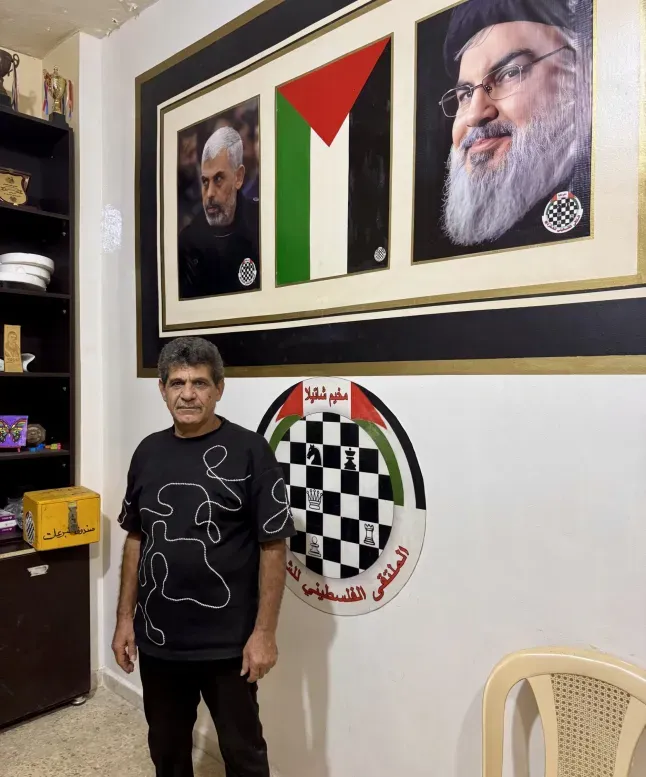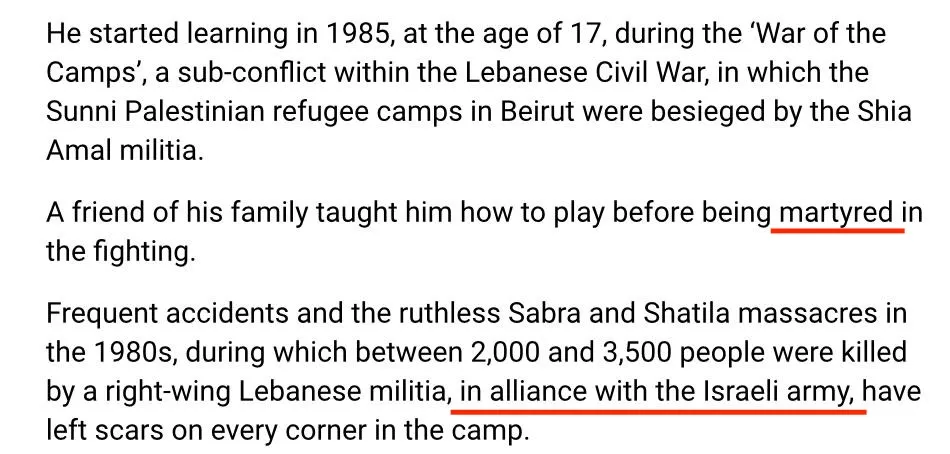Uncategorized
UK Paper Inadvertently Exposed Terror-Supporting Palestinian Chess Club — Then Hid the Evidence

Hamas leader Yahya Sinwar looks on as Palestinian Hamas supporters take part in an anti-Israel rally over tension in Jerusalem’s Al-Aqsa mosque, in Gaza City, Oct. 1, 2022. Photo: REUTERS/Mohammed Salem
Millions of Britons pick up Metro UK each morning on the London Underground, expecting light news and human-interest stories. So readers could be forgiven for thinking they’d stumbled on a heartwarming feature about a Palestinian chess club offering hope to young refugees.
Titled, “How a chess club took on a refugee camp’s darkest forces – and won,” the story by Gergana Krasteva instead focused on putting a positive spin on some very dark forces within the chess club itself.
And when Metro UK was called out by HonestReporting, editors went to great lengths to cover up the evidence.
There were several obvious clues in the piece that the Palestinian Chess Forum’s focus isn’t exactly benign. For example, the photograph of a map of “Palestine” on the wall, where the colors of the Palestinian national flag cover the entirety of the State of Israel.
But that’s actually subtle compared to the photos Metro included of huge portraits of Hamas October 7 massacre mastermind Yahya Sinwar and Hezbollah chief Hassan Nasrallah.

And it’s not as if Metro UK included the image as an afterthought.
The chess club’s director directly addresses the portraits (one of which Metro erroneously states is Ismail Haniyeh rather than Sinwar):
Gesturing at the two portraits on the wall – of former secretary-general of Hezbollah, Hassan Nasrallah, and former Hamas leader, Ismail Haniyeh, who were both assassinated by Israel in 2024, the director says: “We are not an NGO, or an official humanitarian organisation. This is why we can have their portraits here.”
But where is this terror-sympathizing chess club getting its funding from? None other than Christian Aid, a major UK charity, which “provided microgrants to 59 community groups in 2024, including the chess club in Shatila.”
In other words, Metro UK had just published a glowing endorsement of an organization that openly venerates terrorist masterminds — and inadvertently exposed a UK-registered charity’s financial link to it.
A Journalistic Cover-up
When HonestReporting contacted Metro UK about this journalistic disaster, the outlet didn’t issue a correction, a retraction, or even an editor’s note.
Instead, the story was quietly rewritten.
2/
REMOVED: The photo of terrorist leaders Sinwar and Nasrallah on the chess club wall.
ERASED: This paragraph, where the chess club director proudly acknowledges the terrorist portraits (one of which Metro’s correspondent mistakenly identifies as Ismail Haniyeh). pic.twitter.com/L0kasGiMfx
— HonestReporting (@HonestReporting) October 28, 2025
The updated story no longer includes the photo of the Sinwar and Nasrallah portraits, along with the paragraph in which the chess club director proudly acknowledged his terrorist heroes.
In addition, references to Christian Aid’s support for the chess club have been removed, possibly indicating the charity is hoping to avoid a potential investigation by the UK’s Charity Commission.
But the stealth edit didn’t stop there.
Metro’s editors also tweaked language throughout the article to soften its tone.
A reference to someone being “martyred” (a favorite term for extremists) now reads as “killed,” while the misleading suggestion that the IDF was directly involved in the 1982 Sabra and Shatila massacres was watered down to describe the Lebanese militia responsible as a mere Israeli ally.

What Metro Should Have Done
The responsible journalistic response would have been transparency: acknowledge the error, explain the oversight, and publish a correction.
Instead, Metro UK chose quiet deletion — a modern-day “cleanup crew” sweeping away the evidence.
The original piece could have sparked an important investigation into how extremist ideology persists in Palestinian institutions, and how UK charitable funds might inadvertently sustain it. Instead, it now serves as a case study in media complicity and moral cowardice.
Readers of the updated version will never know what was erased -– but HonestReporting preserved the receipts. You can read the archived version here.
UK charity regulators — and Christian Aid donors — might want to do the same. Something positive could still come from Metro’s blunder, even if it wasn’t what the paper intended.
The author is the Editorial Director of HonestReporting, a Jerusalem-based media watchdog with a focus on antisemitism and anti-Israel bias — where a version of this article first appeared.
Uncategorized
Tucker’s Ideas About Jews Come from Darkest Corners of the Internet, Says Huckabee After Combative Interview

US Ambassador to Israel Mike Huckabee looks on during the day he visits the Western Wall, Judaism’s holiest prayer site, in Jerusalem’s Old City, April 18, 2025. Photo: REUTERS/Ronen Zvulun
i24 News – In a combative interview with US Ambassador to Israel Mike Huckabee, right-wing firebrand Tucker Carlson made a host of contentious and often demonstrably false claims that quickly went viral online. Huckabee, who repeatedly challenged the former Fox News star during the interview, subsequently made a long post on X, identifying a pattern of bad-faith arguments, distortions and conspiracies in Carlson’s rhetorical style.
Huckabee pointed out his words were not accorded by Carlson the same degree of attention and curiosity the anchor evinced toward such unsavory characters as “the little Nazi sympathizer Nick Fuentes or the guy who thought Hitler was the good guy and Churchill the bad guy.”
“What I wasn’t anticipating was a lengthy series of questions where he seemed to be insinuating that the Jews of today aren’t really same people as the Jews of the Bible,” Huckabee wrote, adding that Tucker’s obsession with conspiracies regarding the provenance of Ashkenazi Jews obscured the fact that most Israeli Jews were refugees from the Arab and Muslim world.
The idea that Ashkenazi Jews are an Asiatic tribe who invented a false ancestry “gained traction in the 80’s and 90’s with David Duke and other Klansmen and neo-Nazis,” Huckabee wrote. “It has really caught fire in recent years on the Internet and social media, mostly from some of the most overt antisemites and Jew haters you can find.”
Carlson branded Israel “probably the most violent country on earth” and cited the false claim that Israel President Isaac Herzog had visited the infamous island of the late, disgraced sex offender Jeffrey Epstein.
“The current president of Israel, whom I know you know, apparently was at ‘pedo island.’ That’s what it says,” Carlson said, citing a debunked claim made by The Times reporter Gabrielle Weiniger. “Still-living, high-level Israeli officials are directly implicated in Epstein’s life, if not his crimes, so I think you’d be following this.”
Another misleading claim made by Carlson was that there were more Christians in Qatar than in Israel.
Uncategorized
Pezeshkian Says Iran Will Not Bow to Pressure Amid US Nuclear Talks

Iranian President Masoud Pezeshkian attends the Shanghai Cooperation Organisation (SCO) Summit 2025, in Tianjin, China, September 1, 2025. Iran’s Presidential website/WANA (West Asia News Agency)/Handout via REUTERS
Iranian President Masoud Pezeshkian said on Saturday that his country would not bow its head to pressure from world powers amid nuclear talks with the United States.
“World powers are lining up to force us to bow our heads… but we will not bow our heads despite all the problems that they are creating for us,” Pezeshkian said in a speech carried live by state TV.
Uncategorized
Italy’s RAI Apologizes after Latest Gaffe Targets Israeli Bobsleigh Team

Milano Cortina 2026 Olympics – Bobsleigh – 4-man Heat 1 – Cortina Sliding Centre, Cortina d’Ampezzo, Italy – February 21, 2026. Adam Edelman of Israel, Menachem Chen of Israel, Uri Zisman of Israel, Omer Katz of Israel in action during Heat 1. Photo: REUTERS/Athit Perawongmetha
Italy’s state broadcaster RAI was forced to apologize to the Jewish community on Saturday after an off‑air remark advising its producers to “avoid” the Israeli crew was broadcast before coverage of the Four-Man bobsleigh event at the Winter Olympics.
The head of RAI’s sports division had already resigned earlier in the week after his error-ridden commentary at the Milano Cortina 2026 opening ceremony two weeks ago triggered a revolt among its journalists.
On Saturday, viewers heard “Let’s avoid crew number 21, which is the Israeli one” and then “no, because …” before the sound was cut off.
RAI CEO Giampaolo Rossi said the incident represented a “serious” breach of the principles of impartiality, respect and inclusion that should guide the public broadcaster.
He added that RAI had opened an internal inquiry to swiftly determine any responsibility and any potential disciplinary procedures.
In a separate statement RAI’s board of directors condemned the remark as “unacceptable.”
The board apologized to the Jewish community, the athletes involved and all viewers who felt offended.
RAI is the country’s largest media organization and operates national television, radio and digital news services.
The union representing RAI journalists, Usigrai, had said Paolo Petrecca’s opening ceremony commentary had dealt “a serious blow” to the company’s credibility.
His missteps included misidentifying venues and public figures, and making comments about national teams that were widely criticized.


